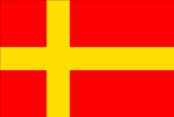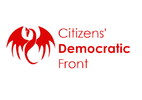Ehnesi Federation
This article uses a non-standard infobox to display information. Please transcribe the information to a standard infobox appropriate for the article. |

| |
| Flag | |
| Motto: Lycka till ala (Swedish: Happiness to all)
| |
| Anthem: "In New Scandinavia I do abide"
| |
| Location: Colchester, Essex | |
| Capital city | Lindum (ceremonial)
Fairfax-Norbury (legislative) |
|---|---|
| Largest city | Lindum |
| Official language(s) | English, Dutch, French, Korean, Malayalam, Swedish |
| Official religion(s) | Christianity (non-denominational) |
| Short name | New Scandinavia |
| Demonym | New Scandinavian |
| Government | Federal Executive Constitutional Parliamentary Monarchy |
| King | Solomon II |
| - Prime Minister | David Easterling |
| - Chancellor | Matthew Thomas |
| Legislature | Parliament |
| Established | 14 September 2017 |
| Area claimed | <1 km² |
| Population | 29 (as of 2020 census) |
| Currency | New Scandinavian Krone |
| Time zone | UTC+0 (GMT) |
| National sport | Goalball |
| National animal | Peacock |
| Patron saint | St. Francis, St Thomas |
| This nation is a member of the New Scandinavian Commonwealth | |
| Website under construction | |
The Ehnesi Confederation, commonly referred to as Ehnes and sometimes styled to NS, is a New Nation Project, also known as a micronation, located in East Anglia, England. It was formed on the 18 September 2017, and is largely based around the town of Colchester, Essex, but has since expanded to include territory from Sweden, the Netherlands and Belgium. Despite a largely consistent population base, the Confederation has had a turbulent history, which can be divided into five federations and multiple interregnums. The current, most recent iteration of the project began of 1 March 2020, with the establishment of the Fourth Federation.
Etymology
New Scandinavia was first conceived at a time when the 1st and current monarch, Solomon II, was exploring his Scandinavian heritage. He wanted the name to reflect this, and many of the other citizens admired the model of Scandinavia and the Nordic Countries. Therefore, the name "The Federated States of New Scandinavia" was chosen.
However, any form of Scandinavian influence was lost fairly quickly into the project, and there have been multiple attempts to change it, to more accurately reflect this. In April 2018, the name was officially changed to New Scandia, and some began using the term. But by this point, New Scandinavia had already been embedded in the nation, and as such the new name gradually fell out of use. Though no official legislation was passed to revert it (largely due to a bureaucratic legislative system) and in spite many proposals to change it once, New Scandinavia stayed as the commonly accepted name.
Due to its contentious history and fairly cumbersome length, most citizens refer to the country simply as "NS," as did many official documents.
When New Scandinavia returned during the St. David's Day Revival, more and more citizens began expressing displeasure with the name's conitued use. The Acting Government promised a vote on the issue On the 7th April 2020, when, as part of the 13th election cycle, a name and flag referendum was held. The alternative name, Ehnes, was chosen as it was a phonetic spelling of the initialism NS, the most commonly used name for the nation. The new name passed with 56% of the vote, and the Ehnesi Conederation officially came into being
The pre-title refers to the fact that Ehnes has a very federalised system as a group of aligned states (though the closeness of this has long been disputed; see History and Politics). Despite being a monarchy with a king as Head of State, "Confederation" is the official term.
History
1st Federation
Foundation
In early autumn of 2017, King Solomon II began to become interested in Scandinavian culture and languages. With family living in Sweden, he began to prefer the way of life experienced in the Nordic countries than that of his own. Therefore in early September, he found the New Scandinavian Society - an organisation dedicated to the promotion of Scandinavian ideas in the UK. During this time, Solomon met Eustace Nyatt, who encouraged Marinus to found a nation on those ideals, and the concept of a New Scandinavian nation was born. Independently, David Easterling then discussed the concept of micronationalism, New Scandinavia, and another nation he was planning on founding, the somewhat tongue-in-cheek United Streamist Republic. Over the coming days, the state's concept was fleshed out. The Federated States of New Scandinavia was officially formed of the 14th September 2017. Very quickly the nation began to expand, with friends catching wind of the project and adding their own states, most notably Matthew Thomas, Kai Velez and Dominic Nay. By mid-September, New Scandinavia had essentially been diving into 6 different states: Peacoland, Conland, Esaland, Fairfax, and the tongue-in-cheek Cushonia, and Chez de Toilette.
2nd Federation
3rd Federation
4th Federation
Politics and government
The Monarchy
New Scandinavia functions as an Elective Executive Constitutional Monarchy. The Monarch, chosen by the citizenry will serve a life term, unless he/she chooses to abdicate.. They hold significant emergency powers, and can propose and suggest laws, however, these laws must go through the Parliament like any other bill. For the most part, however, the monarch is a largely ceremonial position, being the speaker of Parliament and the official symbol of the state. The current monarch is Solomon II, having ascended to the position since the foundation in 2017. According to the most recent census, the kings enjoys a 66.7% approval rating, and is the nation's chief musician, having made multiple albums
Elections
Ehnes runs as a semi-presidential system, with 2 main elected office. The Prime Minister, a position in place since Foundation, is the leader of the largest party in parliament, currently held by David Easterling, the fourth in that position. The position of Chancellor was created as part of the St. David's Day Revival in an attempt to create a more directly democratic office, and is elected as the same time as Parliament, through a simple poll of all the citizenry. The incumbent, and first Chancellor is Matthew Thomas. Elections are typically held once every 3 months, and citizens vote using the Alternative Vote method, ranking the candidates.
Parties
Much of New Scandinavian Politics can be defined as a struggle between Unionism and Confedralism. Most of the earliest parties in New Scandinavia were largely united in ideology, differing only in leadership. Gradually a factional divide emerged between those who wanted a more centralised government (known as Unionists) and those who wanted more power to the individual states (known in Separatism). Early governments took a moderate position on this, known as Fedralism, but with the advent of Radical Unionist Eustace Nyatt after the 2nd Interregnum (through which he ran the guerrilla SEP-NS, the nation became far more centralised. As a reaction to this the Separatist Party ReNew was formed by David Easterling, advocating for a 'EU-style' system, and an end to what was known as "Founders' Rights" - a perceived inequality between those who founded the nation and later members. The rivalry between Nyatt and Easterling caused greater polarisation in the political system, though neither held elected office - opting for the Moderate, Dominic Nay, and Matthew Thomas. After 2 years as the official opposition, Easterling was elected at the 6th Prime Minister. The debate seemed to die down after this, however, since the St. Davids' Day Revival, arguments have restarted over with the closeness of the Union, particularly over the use of 'confederation' as the official pre-title. The current Government takes the position of Confederalism, a more moderate form of Separatism, with opposition keeping with Radical Unionist tradition
Here is a table of notable former parties:
| Party | Ideology | Spectrum | Leader | Party Existence | As Government | Notes | ||
|---|---|---|---|---|---|---|---|---|
| Socialist Party | SP | Socialism, Unionism | Left | Triumvirate, later Eustace Nyatt | 17 April - 20 July 2018 | 17 April - 20 July 2018 | Almost hegemonistic control over politics during its duration, winning landslides and widespread popularity, but party infighting caused it to splinter after a relatively short time in government. | |
| ReNew | RN | Egalitarianism, Sepratism | Left | David Easterling | 10 July 2018 - 1 August 2019 | 31 January - 1 August 2019 | By far the longest running party in NS politics, but spent majority | |
| People's Republic | PR | Direct Democracy, Big Tent | Centre | Matthew Thomas | 20 September 2017 - 22 February 2018 | 20 September 2017 - 22 February 2018 | Very Popular for nearly all of both the 1st and 2nd federation, but had very little in specific policy and idea | |
| Socialist Equality Party - New Scandinavia | SEP-NS | Radical Unionism, Trotskyism | Far-Left | Eustace Nyatt | 7 February 2018 - 17 April 2018 | N/A | While it existed for a short amount of time and never held office, the SEP-NS was incredibly influential in the formation of the 3rd Federation | |
Current Parties
Subdivisions
Economy
This section is empty. You can help by adding to it. (April 2023) |
Culture and media
This section is empty. You can help by adding to it. (April 2023) |






